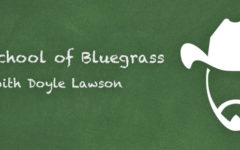
David Morris accepts his Writer of the Year award at the 2019 IBMA Industry Awards – photo © Tara Linhardt
With another successful IBMA World of Bluegrass in the books in Raleigh, it’s time to look back at some of the highlights – and one low light – of the weeklong celebration of bluegrass.
———-
AWARDS, LIGHTLY
Since money is tight, I have a suggestion that might save some.
Each winner receives a glass obelisk, with “IBMA” and a banjo head engraved on one of the four sides and a metal plaque with the year, category and winner’s name attached to the base.
This year, Brooke Aldridge won female vocalist of the year for the third straight year. My suggestion, if she wins again – a feat she is quite capable of given the release of a compelling new CD with her husband Darin: let’s just skip the trophy and give her a new plaque to attach to one of the three remaining sides of this year’s award.
Of course, I jest.
AWARDS, SERIOUSLY
But maybe Brooke Aldridge won’t win female vocalist of the year next year. Indeed, maybe nobody will. Maybe, just maybe, that award should be retired, and one award – Vocalist of the Year – should be presented.
The idea was first presented to me last week by Daniel Routh of Nu-Blu. He pointed out that vocalist is the only category segregated by gender. All other awards, for instrumentalists, songs, etc., are awarded to the top vote-getter. Even vocal group of the year, won this year by Sister Sadie, isn’t gender-specific.
Daniel’s idea is a good one. Why, at this point, is that award broken out that way?
Several board members have told me they have heard similar thoughts from others, so don’t be surprised if next year or soon after, IBMA presents a single trophy for vocalist of the year.
At a town hall meeting during World of Bluegrass, board President Joe Mullins said the board would one again review and tweak awards criteria over the winter, with a special focus on Distinguished Achievement and Hall of Fame balloting.
Merging two awards into one would also make room for IBMA to correct a longstanding oversight and add Songwriter of the Year to the evening program. Without songs, none of the other recipients would be standing on that stage. The songwriter award and others are presented during a Thursday afternoon lunch, which doesn’t have the same visibility or cachet as the evening awards.
There’s always one point of contention or another over awards. This year, the biggest was over Bill Monroe: The Life and Music of the Blue Grass Man, written by Tom Ewing and published by University of Illinois Press.
Much to the surprise of many IBMA members, Ewing did not make the list of five finalists for Writer of the Year (previously called print person of the year). Turns out, as Mullins explained after complaints were aired at the town hall meeting, not one person nominated the book for the award. Since self-nominations are allowed, it seems astonishing that Ewing didn’t submit his name, and neither did his publisher or any of the folks who complained about its exclusion from the list.
But hats off to IBMA board members and those who work on the committee that selects the finalists for resisting the pressure to make an exception and add the book. That used to be allowed but isn’t since the awards were restructured.
Ewing’s book might have been worthy of inclusion, but allowing the panel to add candidates that didn’t make the cut or weren’t even proposed opens the door to potential shenanigans.
(Full disclosure: I haven’t read the entire book. Also, perhaps I benefitted from its exclusion. I won the Writer of the Year award. That might not have happened if the book had been among the finalists. In fact, I might not have made the final five.)
FAVORITE MOMENTS
From my perspective, two standout moments took place on Thursday. First, at the Industry Awards lunch, my friend Katy Daley received a Distinguished Achievement Award. The legendary broadcaster – that’s a factual adjective, not hyperbole – ruled the airwaves on WAMU in the Washington, DC, area for decades. If anyone has done more for bands, songwriters, and the industry in general for a longer period of time, I’d like to meet her or him.
Katy’s award was long overdue in my book. And it shouldn’t be her last. Shortly after the award was presented, broadcaster Steve Martin and others jumped on the Katy Daley for the Bluegrass Hall of Fame bandwagon.
She deserves it, for sure, and it will happen some day. The list of worthy candidates for that capstone honor grows by the year. It’s a select group, and it should be. I’d bet the farm, though, that the doors open for Katy sooner rather than later.
My other favorite moment happened during Thursday night’s show, when the Bass Player of the Year was announced.
“Are you freaking kidding me?” Missy Raines shouted with glee when she arrived at the podium. This was her eighth win, which puts her in rarified company with Michael Cleveland, Rob Ickes, Adam Steffey, Jerry Douglas, and just a few more
All of those players are likely to join the Hall of Fame over time, and Missy should definitely accompany them. She won the bulk of her awards for playing bluegrass at a time when women just didn’t win instrument awards. Thankfully, that’s no longer the case, in large part because Missy paved the way for recent winners.
Missy isn’t a full-time grasser these days, and hasn’t been for a few years. She’s still young, though, so there’s plenty of time to add to her numbers and her legacy. But if she stopped playing today, her existing body of work speaks for itself and would be worthy of the ultimate honor in bluegrass.
COMING UP
Every year at IBMA, it seems I stumble across a family band that knocks my socks off. At one point, it was the Bankesters. Then it was Flatt Lonesome. Last year, the Family Sowell popped on my radar and stayed there.
On my keep-an-eye-on list this year is Echo Valley, a family band from western Pennsylvania. The sets I saw, including at the Leadership Bluegrass Reception on Monday night, offered a mix of bluegrass, Andrews Sisters, and other standards from the American songbook.
The sisters, joined occasionally by their brother, are fun to watch and listen to. And, though still a bit green and rather shy, they’ve already caught the ear of a couple of labels. One label executive told me the band was “close” to being signable, perhaps after a couple members became a bit more proficient on their instruments. Vocally, though, at least to me, they’re ready.
Their rise and the growing success of the Family Sowell are feathers in the cap of Nashville-area studio head, producer and jack of all trades Stephen Mougin. Both bands worked through Mougin’s band training program.
NOT SO SOUND SOUND
The last two days of the weeklong celebration of bluegrass is one big party. And big parties tend to be, well, loud.
This year, though, it seemed problems with sound at the street fair got in the way of good music too many times to be acceptable.
Two of the most glaring examples:
At the main stage just outside the Marriott and Sheraton hotels – the first outdoor stage many attendees come to – some of the biggest acts in bluegrass had to complete with and lost out to what might be the world’s noisiest compressor at the nearby beer tent.
And at one of the street stages, a soundman got into a tussle with an audience member who complained about the sound, then walked off the job. I didn’t witness either of those events, but heard about them from people I trust. I did find that the sound at that stage was awful, a disservice to fans and to the bands.
I went out of my way one night for a Carolina Blue set at that stage. I saw them, but I can’t say I actually heard them until I walked behind the stage and listened through the stage monitors.
IBMA and Pinecone, the association’s partner for the outdoor performances, are aware of the problems and are said to be working on solutions.
They need to get this right before next year.







